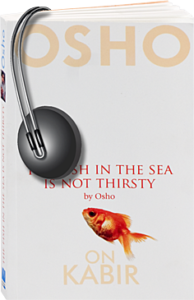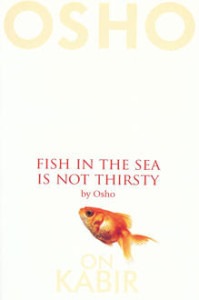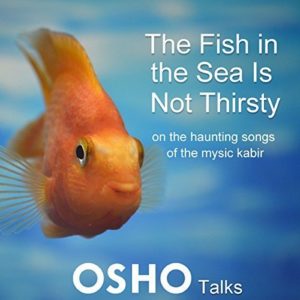Talks on Kabir
The fish in the sea is not thirsty, observes Osho, but man is. Man lives in existence, and is absolutely unaware of it. One is born in existence, breathes in existence. Each human being is godliness, made of the stuff called God, and yet completely oblivious of the fact.
“I laugh, says Kabir, “when I hear that the fish in the water is thirsty; you do not see that the Real is in your home, and you wander listlessly! Here is the truth! Go where you will, if you can’t find where your soul is hidden, for you the world will never be real!”
The Fish in the Sea is not Thirsty Nederlands
Kabir moet lachen
In The Fish in the Sea is not Thirsty wordt betoogd: De vis zwemt rond in de zee zonder dorst te hebben, maar de mens heeft die wel. Hij/zij maakt deel uit van de Existentie, maar hij is zich hier volkomen onbewust van. De mens is geboren in het Bestaan, hij ademt in het Bestaan en hij zal er uiteindelijk ook weer in opgaan. Maar hij heeft er geen weet van.
Men is goddelijk, gemaakt van de stof die “God” genoemd wordt, maar heeft daar geen enkele herinnering aan.
Naar aanleiding van de songs van de wever-dichter Kabir geeft Osho een uiteenzetting, dat wij in de overgangsfase van het dierlijke naar het menselijke verkeren. We worden ons door dit boek bewust hoe we verder kunnen komen en wat we op ons pad kunnen ontmoeten.
Het boek The Fish in the Sea is not Thirsty is verkrijgbaar in de Boekhandel of via internet en ook als audiobook.
Positieve Boodschap
Impressie van The Fish in the Sea is not Thirsty
Commenting on the haunting songs of Kabir, Osho takes the reader to the very core of the human dilemma, to the simple cause of man′s misery – that he thinks that he is separate from existence; his inability to comprehend why the fish in the sea is not thirsty. Osho also answers questions, speaking on emotions and being detached from them, aloneness and love, imitation, children and religion, rebellion, living in a balanced way, sex, the generation gap and much more.
“I laugh, says Kabir, “when I hear that the fish in the water is thirsty; you do not see that the Real is in your home, and you wander listlessly! Here is the truth! Go where you will, if you can’t find where your soul is hidden, for you the world will never be real!”
Through the compositions of Kabir, Osho takes the reader to the very core of the human dilemma, to the simple causes of misery and unhappiness, the duality of man’s existence, the futility of Sunday religion and the illusions of the mind. The emphasis is on Being Yourself and Being Aware. Osho talks of the importance of meditation, understanding, love, celebration, creativity and humour—qualities that in his view are suppressed by adherence to static belief systems.
The Fish is not Thirsty
The fish in the sea is not thirsty, observes Osho, but man is. Man lives in existence, and is absolutely unaware of it. One is born in existence, breathes in existence. Each human being is godliness, made of the stuff called God, and yet completely oblivious of the fact.
Osho’s message is a positive one. He states that we are all potential Buddhas, with the capacity for enlightenment. According to him, every human being is capable of responding rather than reacting to life. He suggests that it is possible to experience innate divinity and to be conscious of who we really are even though our ego’s usually prevent us from enjoying this experience. However, unless one is ready to dissolve one’s ego, the fish is going to remain thirsty. Dissolve the ego and all the thirst disappears, because then the wall between you and the ocean disappears; then you are a part of the ocean.
Enlightenment is a simple realisation that everything is as it should be, everything is utterly perfect as it is. You are part, an organic part of this tremendous, beautiful whole. Everything is in such accord that existence is an orchestra. Everything is rhythmic, in tune. And you are not separate from it like an observer. The observer and the observed are one, the seer and the seen are one—you are it. ‘The Fish in the Sea is not Thirsty’


